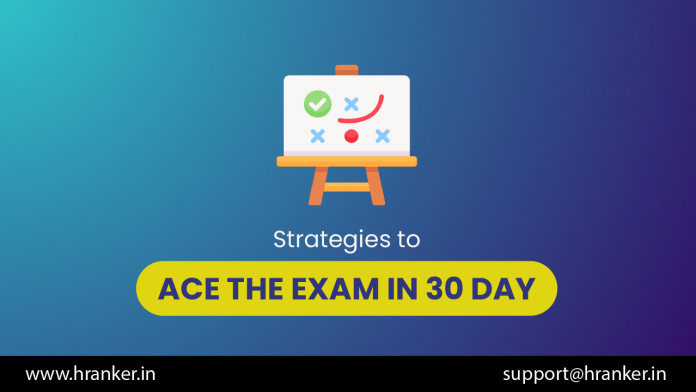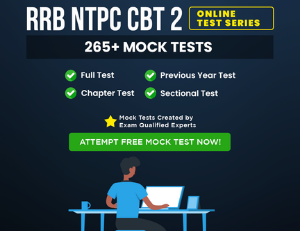Do you have any examinations scheduled in the next 30 days? And you’re seeking some last-minute exam tips and techniques. Don’t be worried! We’ve got everything you’ll need to ace the exam.
Regardless of how much you have studied throughout the year, do your best in the coming days to prepare for the exam.
Here comes the stress-reliever suggestions and strategies which you can follow to outplay your preparations and ace the exam –
Table of Contents
Determine what needs to be done.

Most tests cover certain topics, therefore it’s critical to understand which information or components you must study. Otherwise, you may be wasting your valuable remaining study time. Inquire with your teacher about the topics you’ll be tested on and the portion you should revise.
- Prioritize important topics
Exams often cover a few key ideas, concepts, or skills. When you’re pressed for time, concentrate your efforts on the most vital aspects of your study rather than strewing them around. Review sheets, highlighted areas in textbooks, and parts that your teacher continually emphasised are all indicators of what the most significant topics or components are.
- Determine the test pattern
What kinds of questions will be on it (MCQ, essay, word problem, and so on)? Determine the value of each section. If you’re unsure, ask the teacher. This will inform you of the most significant portions and how the exam will be presented.
Time Management

Manage the remaining time for subject preparation and review. Instead of repeating topics, keep track of what you’ve revised.
- Make a balanced study schedule
Cover all of your studies. Don’t mix up all of the topics at once. Make a timetable of all the things you need to complete. At last, learn or review a concept quickly by explaining it in plain, simple language. This is called the Feynman Technique.
There’s a remark attributed to Albert Einstein that goes:
“If you can’t explain it simply, you don’t understand it well enough.”
Albert Einstein
- Take breaks into consideration
Long periods of study are often less effective than short, repeated periods of study.
Reasoning and memory may be harmed as a result of long study sessions. This is due to our brain’s inability to focus on anything for more than 50 minutes at a time. If you prefer to study for longer periods of time without taking breaks, you may become distracted.
The Pomodoro Technique (25 min study + 5 min break) can help you complete long tasks effectively.
- Specific study time
This creates a routine for your brain, and over time, studying gets easier as your brain is taught to learn in those periods. For example, if you are accustomed to taking a bath in the morning and it takes you only 5 to 7 minutes, try taking a bath in the afternoon someday; you will notice that it takes longer than 7 minutes because your brain is not trained to do so and you need to put extra efforts in doing the same task.
Preferably, choose your exam timings, this will enhance your speed in exam.
Avoid distractions

- Shut Social Media Up!
It may appear difficult! However, a small sacrifice can work wonders for you! After all, social media isn’t going away. So, keep the distractions away for at least a month, until your exams are finished. For a while, turn off all social media accounts and don’t use your phone while studying.
Practice – makes man perfect!

- Targeted Study Sessions
It can be beneficial to have a goal with a reward to strive for. Set up rewards for reaching study milestones and achieving results to increase your value. Give yourself a treat.
- Go through previous year question papers
Solving previous year papers is one of the most effective strategies to prepare for exams when you don’t have much time. This will assist you understand the format of the paper and the time limit. Thereby, you can make your own strategy to ace the exam.
- Review previous 5-10year papers
- Examine the paper pattern, such as the type of question (types of questions, section wise).
- Conduct research on each question in each paper of all subjects and relate it to chapters to determine which chapter is important for short questions, long questions, numerical and derivation questions, and so on.
- You now understand how to prepare each chapter. Now you must categorize important and less important topics from each subject and begin your preparation.
- When you first begin practicing, treat yourself as if you were in an exam hall. This will shorten the time it takes you to complete the paper.
You may practice the Sample papers for your exam here.
Never, ever Cram!

Almost all students have a habit of studying and cramming topics prior to the start of an exam. This is completely incorrect!
It is not advisable to read new topics before the exam because you may forget what you have already remembered.
Health is Wealth!

- Eat healthy food
For effective thinking, good nourishment is essential. A nutritious meal will keep your mind alert. Choose foods that are easy to digest and avoid making drastic dietary adjustments. This will upset your digestion and make you tired. It is also advisable to consume somewhat less than necessary.
- Get adequate sleep
Take plenty of rest before the big day. This is a critical stage that must not be overlooked. Without sleep, your odds of performing well on the test drop dramatically since your brain is unable to focus on what it needs to.
- If you can’t sleep, try some warm milk or tea, but make sure it doesn’t include caffeine!
- Do not change your sleeping habits. To keep your sleeping patterns consistent, go to bed at the same hour every night.
Even if they are the best ideas for studying diligently for your examinations, these strategies require complete dedication, and only then can one get the most out of them. If you are committed to following the guidelines to the point, you will ace the exam with flying colours.
Exam Day Tips!
Set your alarm for the morning and reach the exam center before time. Studying hard but believing you won’t be able to pass the exam will lower your chances of success. So, don’t panic! Just “Trust yourself” have faith in whatever you have studied and enter the exam hall with a positive mindset. Confidence is the key!
All the best for your exam!
Aim for the stars!





That is really interesting, You’re an excessively skilled
blogger. I have joined your rss feed and look ahead to looking for more of your great post.
Also, I have shared your website in my social networks